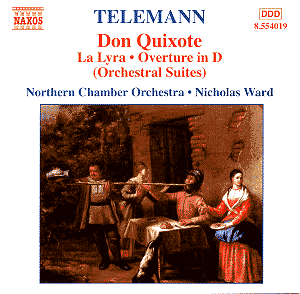One of the most respected and prolific composers
of his day, Georg Philipp Telemann was both rival and friend to
his better-remembered colleague Johann Sebastian Bach. First choice
of the committee to fill the vacant position at the Thomasschule
of Leipzig, Telemann used the negotiations there to better his
position in Hamburg, where he remained until his death in 1767.
The job, of course, went to Bach.
Telemann left behind a vast body of work, both
sacred and secular with some 1043 church cantatas, forty-six settings
of the Passion (one for each year he worked in Hamburg), several
operas and countless works of instrumental music. He is noted
for his adaptation to the times, staying current with and mastering
the changing styles of music that came along during his very long
and productive life.
This disc, delivered with great aplomb by Nicholas
Ward and his Northern Chamber Orchestra, is a showcase of the
composer’s versatility and his gift for writing vivid and picturesque
music. Each of the works in this program is delightful in its
orchestrational genius, and all are played with great style and
conviction.
In what Telemann labeled a burlesque, we are
treated to a programmatic setting of a tale or two from Cervantes’
famous novel Don Quixote de la Mancha. This is musical
story-telling at its finest. Of particular charm is the little
gallop of Sancho Panza’s donkey, and the vivid depiction of Don
Quixote’s attack on the windmills.
The d minor overture is typical of the baroque
dance suite, with obvious influence from the French masters. Especially
noteworthy here is the virtuosic oboe writing. In a tour de force,
the oboists of the Northern Chamber Orchestra deliver a performance
that is near breathtaking. It is simply lovely playing, with a
precision of ensemble attention to detail that is quite above
reproach.
The highlight of the Suite in E-flat is its charming
third movement, La Vielle, which is an orchestral impersonation
of the hurdy-gurdy, and instrument with a drone bass as its principal
element of interest. One does not hear a device like this one
in Baroque music as a rule, and Telemann’s clever insertion of
the folk idiom makes this piece unique and gives it a special
winsome character.
Warm and vibrant sound quality, with concise
and informative program notes round this disc off nicely, adding
yet another gem to the Naxos diadem. Pure delight, this. Buy it.
Kevin Sutton
Colin Clarke
has also listened to this disc
My previous experience
of Telemann on Naxos was not a particularly
happy one (a disc called ‘Best
of Telemann’. The present disc,
which at least has focus, gave far more
pleasure, with the Manchester-based
Northern Chamber Orchestra giving fine,
vivid performances of music from the
pen of this endlessly inventive composer.
Naxos do not seem to
like the idea of a catalogue of Telemann’s
music, however (not a TWV in sight!).
A great shame, considering how much
Telemann wrote and how many ‘Ouvertures’
there may be in any one key. Better
to go to http://infopuq.uquebec.ca/~uss1010/catal/telemann/telgp.html#Orchestre
to sort it all out so at least one can
pinpoint the works properly.
Perhaps the Don
Quixote Suite comes first as it
is one of Telemann’s more famous works.
It consists of French Ouverture followed
by a set of six character pieces. The
full, up-front recording accorded to
the Northern Chamber Orchestra may take
some getting used to, even once the
volume control has been adjusted, for
some upper-range shrillness persists.
Nevertheless, the playing yields much
pleasure, from the nicely clipped dotted
rhythms, sighing suspensions and angular
play of the slow introduction to the
vivacious main body, bright as a button.
This is descriptive
music, so Don Quixote’s awakening is
half-voiced and gradual against an insistent
rhythm. The ‘Sighs of Love for the Princess
Dulcinea’ are literally translated into
music (and suitably exaggerated here);
the witty large intervallic spans of
Sancho’s donkey in the penultimate movement
need no further explanation, except
to mention they brought to mind Mendelssohn’s
‘ee-aw’-ing in the ‘Midsummer Night’s
Dream’ incidental music. Telemann’s
finale is witty: ‘Don Quixote’s Sleep’
sounds folksy and gutsy … until the
final diminuendo into sweet nothing
…
The terms ‘Ouverture’
and ‘Suite’ seem to have been pretty
much interchangeable at this period,
and so it is that the remaining works
share a similarity of format. The D
minor Ouverture begins with a
ceremonially dotted slow section, leading
to a 9/8 fugal section. There is much
civility in evidence, although the Courante’s
textures tended to muddy a little. Still,
the Air is lovely and the Ouverture
concludes in effect with two Gigues.
The penultimate ‘Canaries’ movement
certainly begins in Gigue-like fashion
before giving way to the very active
Gigue-proper.
Finally, the E flat
Suite, ‘La Lyra’. The subtitle
comes from the third movement, ‘La Veille’,
certainly unmistakable because of the
drone (hurdy-gurgy) imitation. The ensuing
‘Sicilienne avec Cadenze’ comes as a
tender, loving contrast.
Thoroughly enjoyable
fare. This is a most approachable coupling.
If you are specifically after Don
Quixote, you could perhaps try Tafelmusik
on Analekta FL2 3138, but
bear in mind this is offered at full
price.
These recordings date
from 1996, but the CD box gives P2003.
If this is indeed their first airing,
it is good they have seen daylight at
last.
Colin Clarke
